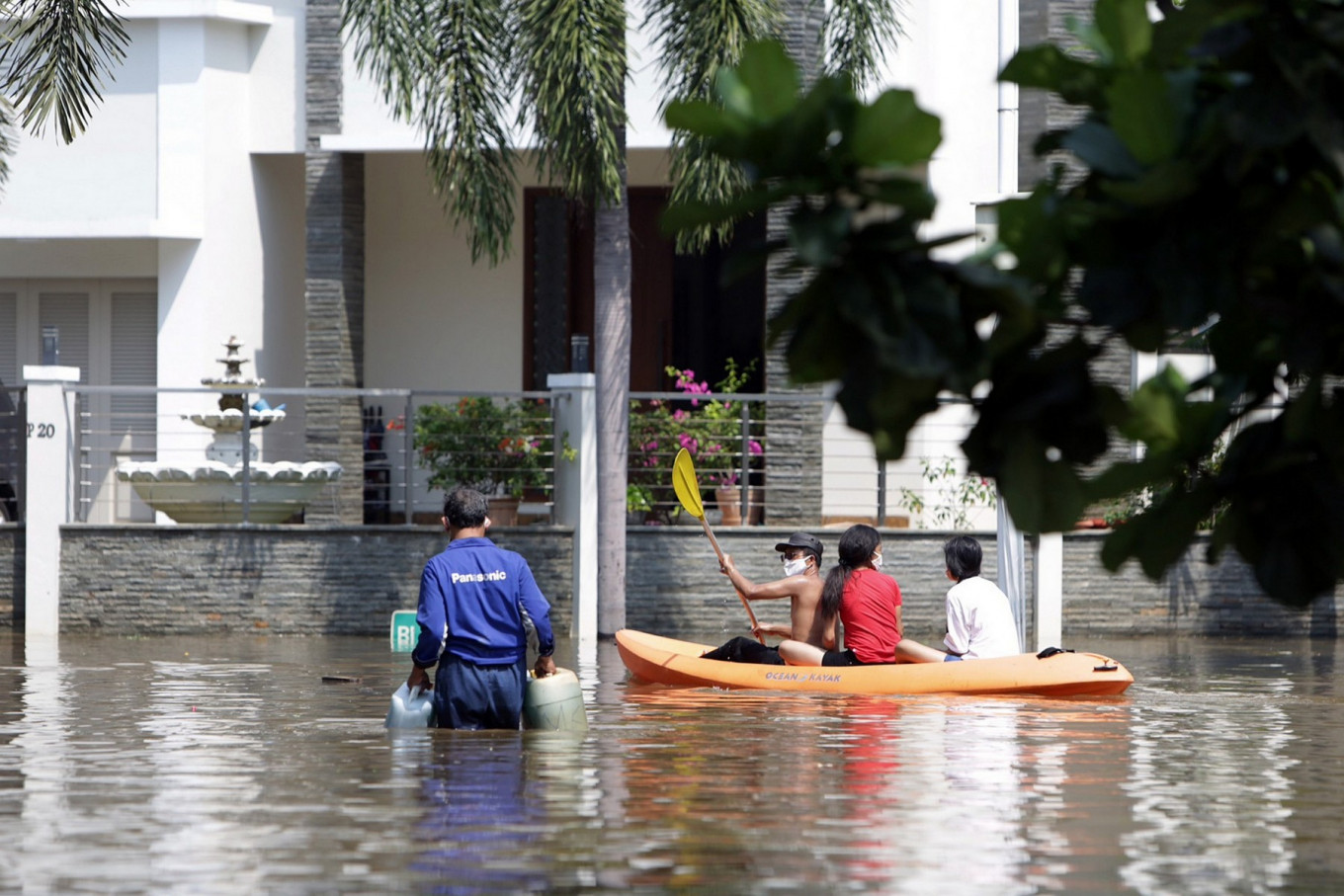Popular Reads
Top Results
Can't find what you're looking for?
View all search resultsPopular Reads
Top Results
Can't find what you're looking for?
View all search resultsPandemic threatens Jakarta flood-mitigation efforts
The Jakarta administration has promised to allocate enough funds for flood control and won’t allow for more funds to be siphoned off, after city funding this year was redirected to help the nation deal with the pandemic.
Change text size
Gift Premium Articles
to Anyone
C
OVID-19 has pushed worst-hit Jakarta to the edge of a budget cliff this year, with city revenue estimated to drop by over 30 percent, complicating efforts to mitigate flooding as the wet season arrives in full force.
But the Jakarta administration promised it would not allow for more funds to be siphoned off from flood control efforts, after city funding was redirected to help the nation deal with the pandemic.
Speaking after a plenary meeting to discuss the revised 2020 city budget last week, Jakarta Governor Anies Baswedan said there would be "no change to budget allocation” for flood control.
The Jakarta administration has seen this year’s budget cut by nearly 30 percent, from Rp 87.9 trillion (US$6.02 billion) to Rp 63.2 trillion. This has forced massive funding reallocation from the capital’s priority programs and activities to the handling of the COVID-19 outbreak.
Among those affected is the city’s crucial flood control budget, which was slashed in half.
But the central government has promised Rp 3.26 trillion in loans this year to the Jakarta administration through the national economic recovery (PEN) fund. Some Rp 1.1 trillion from this loan would be used to fund projects related to flood control, restoring the funds that were cut back.
Jakarta Water Resources Agency head Juaini Yusuf said this year's budget would be used for routine dredging of rivers and reservoirs, revitalizing existing pumps and procuring another 19 mobile pumps and 65 floating pumps, as well as planning embankment design.
“Any such infrastructure development will be carried out in 2021,” he told The Jakarta Post on Sunday.
Flooding is considered one of the capital’s perpetual problems. In relying on a drainage system with an average rainfall capacity of only 100 millimeters per day, Jakarta continues to struggle at the peak of the annual rainy season.
This year, meteorologists expect higher rainfall intensity than usual, and the signs are showing.
The La Niña weather phenomenon could increase accumulated precipitation in Indonesia by up to 40 percent, said the Meteorology, Climatology and Geophysics Agency (BMKG) in October, with heavy rainfall expected in several regions across the archipelago until February 2021.
Jakarta saw rainfall surge to extreme levels in January, with 377 mm of rainfall dousing the capital on New Year’s Day.
The heavy rain, which the BMKG called the worst since 2007, caused severe flooding and claimed lives in the capital and its satellite cities.
In anticipation of more flooding, the city administration plans to allocate at least Rp 1.7 trillion to flood mitigation next year. The central government is also expected to give Rp 7.8 trillion in loans to Jakarta next year.
The largest portion of these funds would be allocated to the development of flood mitigation-related infrastructure, Juaini said without elaborating.
Jakarta Development Planning Agency (Bappeda) head Nasruddin Djoko Surjono has said the city's programs aim to improve resilience and alertness in responding to disasters, which includes flooding and climate change-induced disasters, in addition to disease outbreak.
To accommodate these forward-thinking objectives, the administration proposed to the City Council a revision to its regional medium-term development plan (RPJMD).
“In the revision, we would like to integrate several new concepts, namely a post-pandemic, resilient city, a data-driven government and the smart city, in response to the current situation,” Nasrudin said recently.
Separately, Hadi Susilo Arifin of the Bogor Agricultural Institute's (IPB) landscape architecture department demanded that city officials guarantee that funding for flood mitigation would remain in place, otherwise they risk larger economic losses.
January's floods in the capital are estimated to have cost retailers in Greater Jakarta more than Rp 1 trillion in losses, according to the retailers association at the time. This excludes estimations from other business sectors, and the extent of the pandemic could complicate matters further.
Hadi urged relevant stakeholders not only to focus on hard infrastructure but also "green" ones, like efforts to expand public spaces and enforce compliance on land-use violations at all levels.
“Those measures should be simultaneously conducted,” he told The Jakarta Post.
Dwita Sutjiningsih, a professor of hydrology at the University of Indonesia, said that building a flood-resilient city required cooperation among stakeholders, especially between local and central governments.
Because Jakarta is located downstream of 13 rivers that are under the authority of the central government, problems of flooding "won't be resolved in the long term if they can't coordinate with one another", she said.
The Jakarta administration has often been at odds with the central government in the handling of the COVID-19 pandemic in the capital, and it is only recently that both sides have started seeing eye to eye, observers noted.
For the most part, Jakartans living in flood-prone areas have actually become quite resilient – if not "accepting" of disasters.
Still, authorities play a big role in speedy recovery after the water subsides, Dwita said.
The Jakarta Disaster Management Agency (BPBD) claims to have regularly held emergency response drills and training each year for residents living in such areas, according to the head of the agency's preparedness unit, Embay Suhaimibut. But the outbreak has forced them to halt this year's program to curb potential COVID-19 transmission.
As a replacement, the agency has distributed a handbook on contingency plans through local leaders at the neighborhood level, and is preparing to double the number of shelters so that social distancing can be observed.










